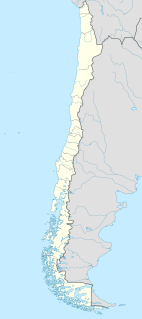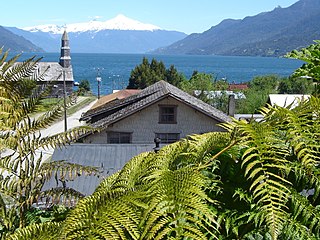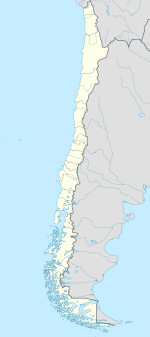
Arica Province is one of two provinces of Chile's northernmost region, Arica y Parinacota. The province is bordered on the north by the Tacna Province of Peru, on the south by the Tamarugal Province in the Tarapacá Region, on the east the Parinacota Province and on the west by the Pacific Ocean. Its capital is the port city of Arica.

Parinacota Province is one of two provinces of the Chilean region of Arica y Parinacota. Its capital is Putre. It is named after the Parinacota Volcano.

Arica is a commune and a port city with a population of 222,619 in the Arica Province of northern Chile's Arica y Parinacota Region. It is Chile's northernmost city, being located only 18 km (11 mi) south of the border with Peru. The city is the capital of both the Arica Province and the Arica and Parinacota Region. Arica has a mild, temperate climate with some of the lowest annual rainfall rates anywhere in the world. Arica is located at the bend of South America's western coast known as the Arica Bend or Arica Elbow. At the location of the city are two lush valleys that dissect the Atacama Desert converge: Azapa and Lluta. These valleys provide fruit for export.

Putre is a Chilean town and commune, capital of the Parinacota Province in the Arica-Parinacota Region. It is located 130 km (81 mi) east of Arica, at an altitude of 3,500 m (11,483 ft). The town is backdropped by Taapaca volcanic complex.

Santo Domingo is an exclusive Chilean coastal city and commune in San Antonio Province, Valparaíso Region. It was founded as Rocas de Santo Domingo.

Huara is a Chilean town and commune in Tamarugal Province, Tarapacá Region. It is located 45 km (28 mi) or northeast of Iquique. The village is crossed by the Pan-American Highway and is the crossing point for the road that goes to Oruro in Bolivia. This road also serves as access to the Atacama Giant site and the Volcán Isluga National Park.

Hualañé is a town and commune of the Curicó Province in Chile's seven region of Maule.

Buin is a city and commune of Chile, in the Maipo Province, Metropolitan Region of Santiago, which forms part of Greater Santiago. It is a city composed of the towns of Maipo, Viluco, Linderos, Valdivia de Paine, Alto Jahuel, Los Guindos and El Recurso. Buin is located about 35 km (22 mi) south of Santiago in the Maipo Valley wine region.

Colchane is a Chilean village and commune in Tamarugal Province, Tarapacá Region.

Cochamó is a Chilean town and commune located in Llanquihue Province, Los Lagos Region. The capital of the commune is the town of Río Puelo, which is named after the Puelo River.

Camarones is a city and commune in the Arica y Parinacota Region in Chile. It forms part of the administrative Arica Province and has a population of 1,220. Its municipality seat is in the town of Cuyo, located next to the Chile Highway 5. Cuyo is the administrative center of the commune and a place of rest for travellers. The main towns are Codpa and Caleta Camarones. The latter is a fishing inlet of only 44 inhabitants. Codpa is the largest town in the commune, located 114 kilometres (71 mi) from the city of Arica. It is an entirely rural commune with almost no tourist activity, and is well known for its uncharted areas. The only Afro-Chilean community in Chile is located in Camarones.

Río Ibáñez is a commune in General Carrera Province, Aisén Region, Chile. It is named after Ibáñez River, a major tributary of General Carrera Lake.

San Juan de la Costa is a commune of Chile, located in the Osorno Province in the Los Lagos Region. The administration (municipalidad) is located at the hamlet of Puaucho, 34 km west of Osorno. San Juan de la Costa is known for its large population of indigenous Huilliches. This commune is characterized by a large coastline suitable for ecotourism, especially balnearios Pucatrihue and Maicolpue, the port of Bahía Mansa, and the ethnic tourism of the Huilliche culture.

San Pablo is a Chilean town and commune located in the Osorno Province in the Los Lagos Region. It is located 27 km from the city and provincial capital of Osorno. The commune is mostly rural. Its activity is almost entirely agricultural and ranching. In the commune also performs Agritourism.

Sierra Gorda is a Chilean commune in Antofagasta Province, Antofagasta Region. The total population was 1,516 as of the 2012 census. The two main settlements are the villages of Sierra Gorda and Baquedano.

Camiña is a Chilean commune and village in El Tamarugal Province, Tarapacá Region. According to the 2002 census, the commune population was 1,275 and has an area of 2,200.2 km2 (850 sq mi).

Calera de Tango is a Chilean commune in the Maipo Province, Santiago Metropolitan Region.

El Tabo is a Chilean commune located in the San Antonio Province, Valparaíso Region. The commune spans an area of 98.8 km2 (38 sq mi). This town is a traditional beach for middle class families.

San Ignacio is a Chilean town and commune located in the Diguillín Province, Ñuble Region. It spans an area of 363.6 km2 (140 sq mi).

Quilleco is a Chilean town and commune located in the Bío Bío Province, Bío Bío Region.















